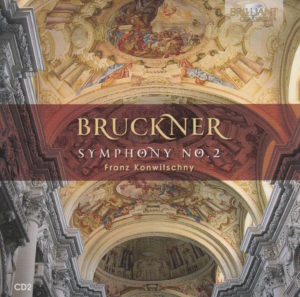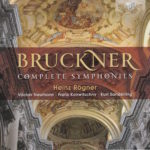 This morning’s conductor of Anton Bruckner’s “Symphony of Pauses” (Symphony No. 2 in C Minor, WAB 102) is German conductor and violist Franz Konwitschny (1901-1962), another person about whom I knew nothing and of whom I had never heard until I started this project.
This morning’s conductor of Anton Bruckner’s “Symphony of Pauses” (Symphony No. 2 in C Minor, WAB 102) is German conductor and violist Franz Konwitschny (1901-1962), another person about whom I knew nothing and of whom I had never heard until I started this project.
His entry on Wikipedia indicates he was an interesting gentleman, indeed:
He started his career on the viola, playing in the Leipzig Gewandhaus Orchestra under Wilhelm Furtwängler. In 1925, he moved to Vienna, where he played the viola with the Fitzner Quartet. He also began teaching at the Wiener Volkskonservatorium. He later became a conductor, joining the Stuttgart Opera in 1927. From 1949 until his death he was principal conductor of the Leipzig Gewandhaus Orchestra. From 1953 until 1955 he was also principal conductor of the Dresden Staatskapelle and from 1955 onward he led the Berlin State Opera.
Like Furtwängler, Konwitschny used “expansive gestures” and had a “dislike of an exact beat.” Konwitschny recorded a complete cycle of Beethoven symphonies.
He was given the nickname Kon-whisky because of his heavy drinking habits.
I thought the conductor for this morning’s symphony was going to be Heinz Rogner. But who can blame me? The largest name on the cover of the box set is Heinz Rogner. (See below, right.) So, naturally, I positioned this CD after yesterday’s Paternostro performance (R comes after P, you see).
However, now it appears this box set – released by the extraordinary Brilliant Classics label – only listed Heinz Rogner’s name larger than the others, giving the impression that it was a Heinz Rogner-conducted series of Bruckner symphonies. Boy, do I have egg on my face.
No worries, mate. (Can you tell I’ve been watching the movies Crocodile Dundee and Australia?)
 For the same reason why I positioned the Bruckner Collection box set under “C” in the listening order – even though the set contains recordings from various conductors – I can leave this one right here, regardless who conducts. The box set states its main conductor is Heinz Rogner. So the set stays in the “R” section.
For the same reason why I positioned the Bruckner Collection box set under “C” in the listening order – even though the set contains recordings from various conductors – I can leave this one right here, regardless who conducts. The box set states its main conductor is Heinz Rogner. So the set stays in the “R” section.
Brilliant Classics is my favorite label for Classical music. Most of what I have – all the box sets, anyway – are from Brilliant Classics. Brilliant releases very high-quality music at the most reasonable prices I’ve ever seen. In short, the value of music from Brilliant Classics is unbeatable.
This box is no exception. Bruckner’s Second Symphony is extremely well done – despite the fact that the recording is 65 years old. I’m not kidding. It was recorded in 1951!
I’ll save the subjective conclusions for the end.
First, more hardcore stats:
Bruckner’s Symphony No. 2 in C Minor, composed in 1872
Franz Konwitschny conducts
Rundfunk-Sinfonie-Orchester Berlinplays
The version used is the 1877 version, Haas edition
The symphony clocks in at 64:40
This was recorded in January, 1951, in Berlin, Germany
Franz Konwitschny was 50 when he conducted it
Bruckner was 48 when he composed it
This recording was released on the Brilliant Classics Record Label
From an essay (written by Philipp Adlung) in the 16-page booklet about Symphony No. 2 in C Minor:
In the Second Symphony, Bruckner obviously endeavors to perpetuate that success. The work is remarkable in style for its classical elements, but equally for it restrained use of abrupt changes in harmony and, above all, chromaticism.
Authoritative work was done in the 1930s by the Austrian musicologist Robert Haas, who published Bruckner’s works in versions purged of “foreign matter.” However, the “old” versions survived for a considerable time in concert usage, and only dedicated work by several conductors was able to change this. Two of them, Eugen Jochum and Franz Konwitschny, were capable, as very few others were, of mastering both the editorial and the interpretational problems of Anton Bruckner’s symphonies and, in so doing, have prepared the way for the Bruckner performances of our day.
Here’s a video clip of Franz Konwitschny conducting. He’s not playing Bruckner, as far as I can tell. This is just to give you an idea who he was, and what he looked like:
Let’s get right down to it – the objective aspects:
Bruckner wrote his symphonies in four parts. The time breakdown of this one (Symphony No. 2 in C Minor, 1877, Haas Edition), from this particular conductor (Konwitschny) and this particular orchestra (Rundfunk-Sinfonie-Orchester Berlin) is as follows:
Moderato………….19:34
Adagio……………….17:49
Scherzo……………….8:59
Finale…………………18:17
Total: 64:40
Okay. Now for the subjective aspects to this morning’s listening:
My Rating:
Recording quality: 3
Overall musicianship: 5
CD liner notes: 5
How does this make me feel: 4
I was all set to give this a “5” for recording quality, and a “5” for how it makes me feel, just based on the historicity of this recording and the quirkiness of the conductor. He seems like a guy with real personality. Plus, it’s Brilliant Classics. How can anything they do not be first rate, the best?
However, the recording quality is somewhat flat. Lots of tape hiss. Lots (and lots!) of ambient sounds (coughing, moving about, etc.). A needle-pushed-to-the-red feeling when the full orchestra reaches a crescendo.
My favorite movement (Adagio – Movement II) isn’t as gripping as it was in previous interpretations of this symphony. The French horn is back a ways in the mix. And it sounds slow to my ears. (The tempo, I mean.) The pizzicato is very pronounced, though, like the mic was right over the strings. Unfortunately, there’s a lot of ambient sound during these crucial slow passages. Maybe a few members of the orchestra had a cold or something. Because there’s a lot of coughing going on.
That’s not to say this is a bad recording or a bad performance. Not at all. This is a major contribution to the Bruckner oeuvre. It’s a recording of immense historical importance. And, given the painstaking manner in which Brilliant Classics approaches these recordings, I’d say this was as good as it could get.
For a recording pushing 70 years of age, this is remarkable. And I feel privileged to hear it.
